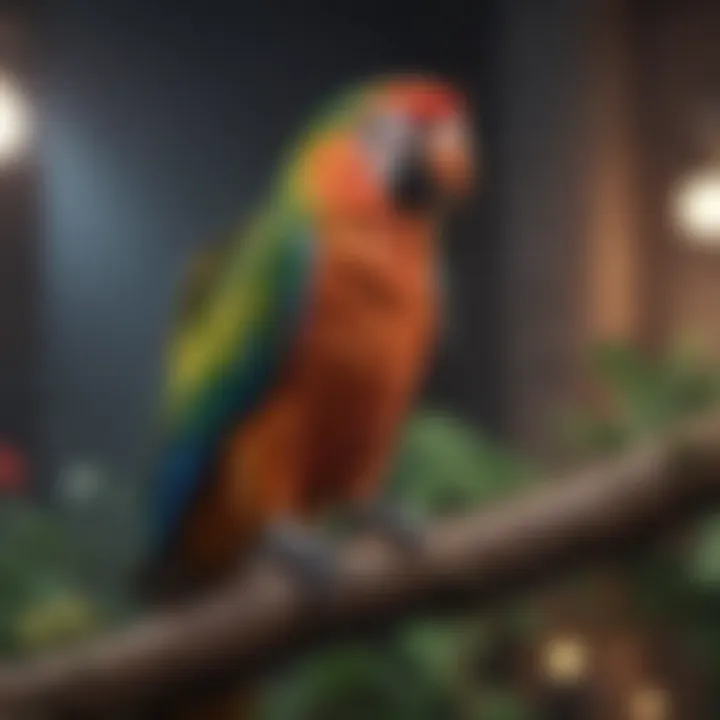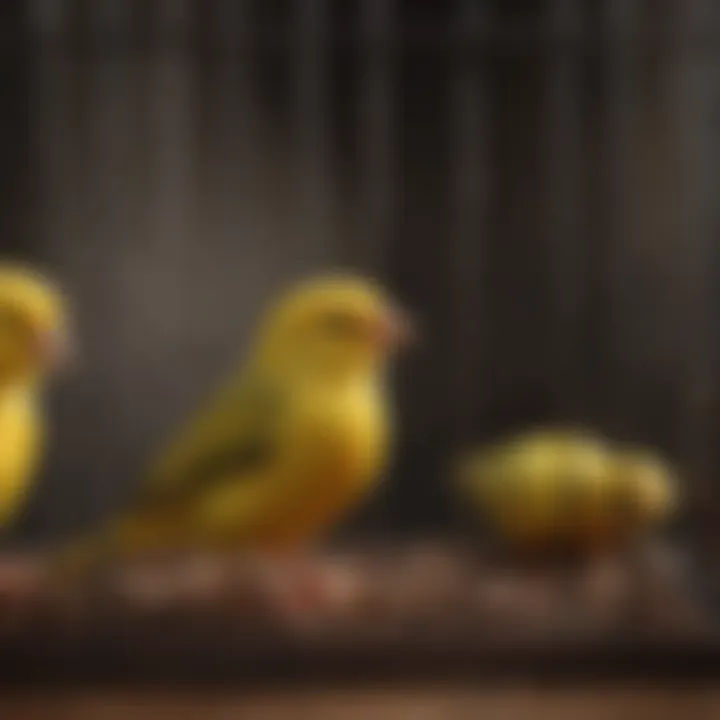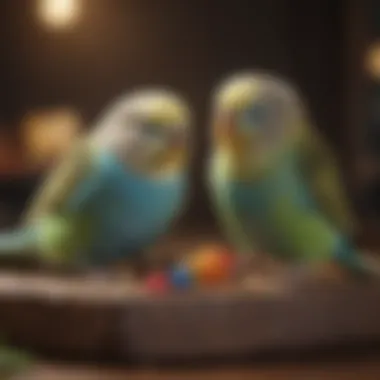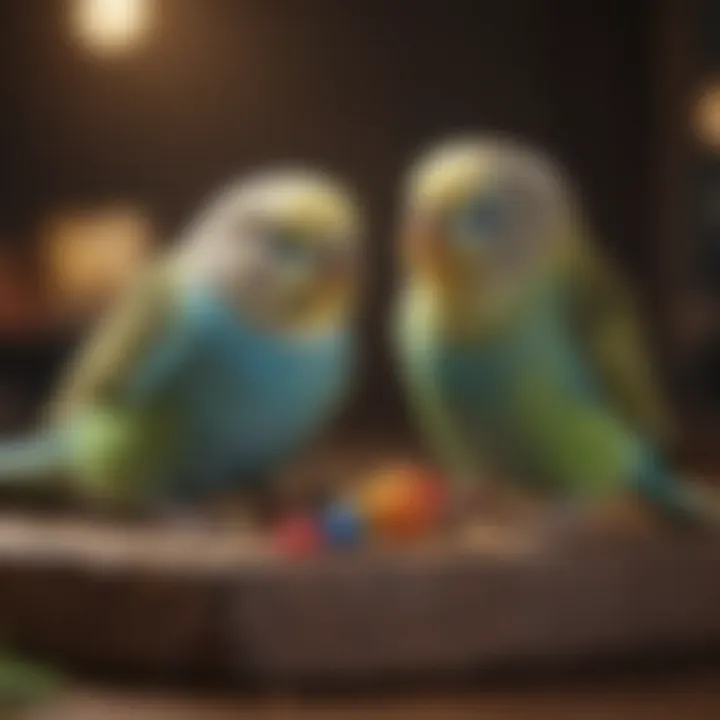Understanding the Challenges of Keeping Birds as Pets


Intro
Keeping birds as pets presents a unique set of challenges and rewards. Unlike traditional pets like cats and dogs, birds have specific needs and behaviors that must be understood to ensure their well-being. This article seeks to explore the intricacies of bird ownership while addressing common misconceptions about these avian companions. Factors such as species differences, environment, and individual temperament can significantly influence one’s experience as a bird owner. Ultimately, our objective is to equip potential and current bird owners with the knowledge necessary for responsible pet ownership.
Care Tips
Caring for birds requires consistent dedication. Their needs must be addressed daily.
Indeed, creating a stable environment greatly benefits their health and happiness.
Daily Care Routines
Birds thrive on routine. A regular feeding schedule helps maintain their health and can lead to a calmer pet. It is essential to provide fresh water and food each day. Observe their eating habits to identify any changes, as this can signal health issues. Daily interaction with pet birds fosters trust and social behavior, which is crucial for their well-being.
Cage Setup and Maintenance
Proper cage setup plays a pivotal role in a bird's health. The cage should be spacious, allowing ample room for movement. Make sure appropriate perches, toys, and food dishes are included. Regular maintenance is necessary to prevent the buildup of waste that can lead to health problems. Cleaning should occur frequently, and substrate should be replaced regularly.
Hygiene and Cleaning Practices
Cleaning the cage is essential for disease prevention. Use non-toxic cleaning solutions to wipe down surfaces and perches. Pay attention to areas where food residue can build up, as these are breeding grounds for bacteria. It is advisable to wash toys weekly as well.
Seasonal Care Adjustments
Seasonal changes can affect your bird’s needs. In the summer, ensure proper ventilation and prevent overheating. During winter, consider using heating elements cautiously. Monitor your bird's behavior closely to detect seasonal stress or changes.
Behavioral Insights
Understanding a bird’s behavior is crucial for fostering a healthy relationship between the pet and owner.
Behavior is often indicative of well-being and comfort.
Understanding Bird Body Language
Birds communicate through body language. Signs of happiness include fluffed feathers and relaxed posture. On the contrary, feathers fluffed out and sideways stance can signal stress or danger.
Common Behavioral Issues and Solutions
Birds may exhibit issues such as biting, excessive screeching, or feather plucking. Identifying triggers is essential. Providing a stimulating environment may reduce unwanted behavior. Addressing these issues through positive reinforcement is effective.
Positive Reinforcement Techniques
Rewarding desired behavior is important for training. Use treats or affection to reinforce good habits. This type of training encourages trust and strengthens the bond between bird and owner.
Social Interaction Needs
Birds are inherently social creatures. They require regular social interaction, both with humans and other birds. Isolation can lead to depression and behavioral issues. Therefore, consider engaging them daily and providing companionship if possible.
Nutrition Guides
Nutrition plays a fundamental role in a bird's overall health. The right diet significantly impacts their longevity and quality of life.
Essential Diet Components
A balanced diet includes quality pellets, fresh fruits, and vegetables. Avoid seed-only diets, as they lack essential nutrients. Research species-specific dietary needs to provide appropriate nutrition.
Safe and Toxic Foods
It is vital to know which foods are safe and toxic for birds. Common safe foods include apples, carrots, and leafy greens. However, adhere strictly to avoiding foods like avocado and chocolate, which are toxic to birds.
Supplements and Treats
Occasional treats, like nuts and seeds, can be included for enrichment. However, this should be in moderation to prevent obesity. As for supplements, consult a veterinarian to determine any necessary additions to the diet.
Feeding Strategies for Different Species
Each species has unique dietary requirements. For instance, parrots might require higher fat content compared to finches. Tailoring feeding strategies accordingly will enhance their well-being.
Wellness and Health
Maintaining a bird's health is a multifaceted task.
Each aspect of care contributes to a thriving lifestyle.
Routine Health Checkups
Regular veterinary visits are crucial for preventive care. Health checks should include overall assessments and screenings for common diseases.
Identifying Symptoms of Illness
Being attuned to your bird's usual behavior allows for early detection of illnesses. Watch for changes in eating habits, vocalization, or feathers. Seek veterinary advice immediately if symptoms arise.
Preventative Care and Vaccinations


Consulting with a vet about vaccinations and preventative measures is essential. Such measures might include regular deworming and parasite control, ensuring birds stay protected against common diseases.
Mental and Emotional Well-being
Birds require not just physical care but emotional support. Providing opportunities for play and social interaction fosters their emotional health. An enriched environment promotes overall well-being.
Enriching Activities
Engaging birds in various activities stimulates their minds.
Since birds are intelligent, they require varied stimulation.
Toys and Playtime Ideas
Incorporate a variety of toys that challenge their intellect. Rotate toys regularly to maintain interest. Consider options like climbing structures, mirrors, and puzzle toys.
Training and Tricks
Training can be a fun way to bond with your bird. Simple tricks like step up or wave can enhance your relationship and fulfill their need for mental engagement.
Outdoor Activities and Interaction
Supervised outdoor time can provide sensory enrichment. However, safety measures must be taken. Harness training can be an option for taking birds outdoors safely.
DIY Projects for Mental Stimulation
Creating DIY toys using safe materials can both save money and provide mental challenges. Items such as paper, cardboard, or wood can be transformed into stimulating playthings.
In summary, caring for birds involves understanding their unique needs and behaviors. Each section outlined here serves to educate potential and current bird owners, ensuring that these beautiful creatures receive the care they deserve.
Prolusion to Bird Ownership
The journey into bird ownership involves various aspects that are crucial for prospective bird owners to consider. Understanding what it means to keep a bird as a pet lays the foundation for a rewarding experience. Birds are unique, often complex creatures that require thoughtful attention and dedicated care. Before acquiring a pet bird, potential owners should reflect on their lifestyle and the specific needs of the avian species they intend to adopt.
Bird ownership brings numerous benefits. Birds can be delightful companions, bringing joy and liveliness into homes. Their varied personalities and behaviors contribute to a dynamic household environment. Additionally, the opportunity to bond with a bird can lead to a deep sense of companionship that many find fulfilling. However, with these benefits come significant responsibilities. Understanding the time commitment, care requirements, and potential challenges is essential.
Prospective bird owners must also acknowledge the various species available, each with its unique care needs and temperament. Some birds, such as budgerigars, are known for being relatively easy to care for, while larger species like macaws may require more extensive care and social interaction. To facilitate an informed decision, engaging with existing bird communities or conducting thorough research can be valuable.
Having a clear understanding of what bird ownership entails is fundamental. It allows for an accurate assessment of compatibility between potential owners and their chosen avian companions. As we dive deeper into the following sections, we will explore the historical context of birds as pets, their current popularity in domestic settings, and the various factors influencing successful bird ownership.
Historical Context of Birds as Pets
Birds have been cherished as companions for thousands of years. Evidence shows that ancient cultures such as the Egyptians and Romans kept birds like parrots and finches in their homes. These early examples demonstrate that the bond between humans and birds is not a modern phenomenon. Throughout history, birds have been viewed not only as pets but also as symbols of beauty and status among several societies.
The domestication of certain species, notably parrots, emerged from these historical practices. Parrots, with their vibrant feathers and apposite mimicry, became highly sought after. Today, the legacy of these ancient practices affects modern bird ownership, as people continue to seek the joy of keeping birds in their homes.
Popularity of Birds in Domestic Settings
In recent decades, birds have surged in popularity among pet owners. Various factors lead to this trend. Their smaller size compared to dogs or cats allows for easier accommodation in urban environments, where living space may be limited.
Commonly kept birds include parakeets, cockatiels, and canaries. These species appeal to a wide audience due to their social nature and relatively simple care needs. Birds often engage in playful behaviors, providing entertainment and companionship for their owners.
Awareness around the ethical considerations of pet ownership has also grown, prompting many potential owners to seek out species that thrive in domestic settings. Organizations like the American Society for the Prevention of Cruelty to Animals emphasize the importance of adopting birds, leading to increased interest in bird rescue and adoption efforts.
The rise of social media platforms also plays a role in popularizing birds as pets. Many bird owners share their experiences, showcasing the diverse personalities of their avian friends. This visibility often encourages others to consider bird ownership, igniting a passion for aviculture.
In summary, understanding the historical significance and current trends in bird ownership provides essential context for potential pet owners. As we progress through the article, further insights will be shared about bird behavior, care needs, and the realities of living with these fascinating creatures.
Understanding Bird Behavior
Understanding the behavior of birds is foundational for anyone considering them as pets. Bird behavior encapsulates their social needs, communication styles, and common challenges owners may face. Recognizing these elements can dramatically enhance the relationship between bird and owner, ensuring a more harmonious living environment.
Birds, much like humans, exhibit a range of behaviors that stem from both instinct and learned experience. This understanding helps potential owners to create an enriching habitat and address specific needs effectively. Furthermore, it provides insights into the emotional and psychological welfare of birds, which is critical in ensuring that they are not just well-fed, but also mentally stimulated.
Social Dynamics of Birds
Birds are inherently social creatures. In the wild, many species live in flocks, which provides them with companionship and security. When kept as pets, it is crucial to understand this aspect of their nature, as loneliness can lead to stress and behavioral issues.
- Companionship: Birds often thrive in the company of their own kind. For instance, budgerigars are known to be happier when they share their environment with another budgie. Owners should consider keeping pairs of compatible species to fulfill their social needs.
- Hierarchy: Birds establish social structures. This includes dominant and subordinate birds. Recognizing these dynamics can help manage interactions, especially in multi-bird households. It can also enhance one's understanding of aggression or bonding behaviors.
- Interaction with Humans: Birds also form bonds with humans. Engaging with them through play and conversation can help build a strong human-bird relationship. This connection will not only enrich the bird’s life but also provide emotional fulfillment for the owner.
Communication Styles in Avian Species
Effective communication is vital in all relationships, and that holds true for the bond between birds and their owners. Birds communicate in various ways, and understanding these cues can lead to better care and management.
- Vocalization: Each species has its own unique set of sounds. For example, cockatiels often whistle, mimicking melodies they hear. Being attuned to these sounds helps owners identify when their birds are happy, stressed, or in need of attention.
- Body Language: Birds communicate through posture, wing movements, and even feather ruffling. An understanding of body language can reveal much about a bird’s emotional state. For instance, a puffed-up bird may be feeling threatened, while a relaxed posture indicates comfort.
- Social Calls: Birds may use specific calls to communicate with others, especially during breeding season. Knowing these calls can help owners monitor their pet's health and mood, allowing for necessary interventions if they observe a change.
Common Behavioral Issues
Even with the best of care, bird owners may face certain behavioral challenges. Understanding these issues is vital for addressing them promptly and effectively.
- Screaming: Excessive screaming is common, often arising from boredom or a need for attention. Providing stimulating toys or setting aside dedicated playtime can mitigate this behavior.
- Aggression: Some birds can be territorial or aggressive, especially during breeding. Recognizing the triggers of aggression can help owners manage interactions and avoid injury to themselves or the bird.
- Feather Plucking: This often signifies stress, boredom, or health issues. It is imperative for owners to monitor their bird's behavior closely and consult a vet if feather plucking occurs frequently.


Understanding bird behavior is not only crucial for their care but also ensures a fulfilling ownership experience. A well-informed owner will lead to a happier, healthier pet.
Species-Specific Considerations
Understanding the specific needs and characteristics of different bird species is crucial for potential pet owners. Each species has its own behavior, dietary requirements, and social needs. This section highlights the importance of choosing the right species for your lifestyle, ensuring a harmonious relationship between bird and owner. By recognizing the unique traits of various birds, one can prevent potential issues and foster a fulfilling companionship.
Small Birds: Budgerigars and Canaries
Small birds like budgerigars and canaries are often favored by first-time bird owners due to their manageable size and relatively low cost. Budgerigars, commonly known as budgies, are social and can learn to mimic sounds and phrases, which some owners find rewarding. They enjoy interacting with humans and can develop close bonds.
Canaries, meanwhile, are known for their beautiful singing and generally more solitary nature. While they may be less interactive than budgerigars, they still require attention and care. Their diet typically consists of seeds and leafy greens, and they benefit from regular exercise outside their cage.
Considerations when caring for small birds include:
- Dietary Needs: A balanced diet is vital.
- Cage Space: Ensure sufficient room for flight within the cage.
- Social Interaction: Spend time with them regularly to prevent loneliness.
Medium Birds: Cockatiels and Lovebirds
Medium birds such as cockatiels and lovebirds display distinct personalities and social behaviors. Cockatiels are friendly and enjoy being handled. They can whistle tunes and form strong bonds with their owners. These birds have a playful nature and require regular mental stimulation to prevent boredom.
Lovebirds, on the other hand, are known for their affectionate behavior. They thrive on companionship, often bonding strongly with their owners, or even with other birds. Their social needs underscore the importance of attention and interaction.
Key factors for medium bird care include:
- Social Needs: Ensure they have company or interactive time.
- Training Requirements: Consistent training helps in behavior management.
- Health Monitoring: Frequent veterinary check-ups can catch potential health issues early.
Large Birds: Parrots and Macaws
Large birds include parrots and macaws, which require significantly more care and commitment. Parrots, known for their intelligence and ability to mimic speech, can become part of the family due to their engaging personalities. However, their outgoing nature can lead to behavioral challenges if not properly managed.
Macaws are even larger and require extensive space due to their size and social needs. They are highly intelligent and necessitate regular mental and physical activities. Their diet is also more complex, involving fruits, vegetables, and specially formulated pellets.
Considering large birds involves:
- Commitment: Long lifespans mean long-term responsibility.
- Space Requirements: Larger cages and a dedicated area for exercise are essential.
- Engagement: Interactive toys and social time are crucial for mental health.
It is important to evaluate if your lifestyle matches the needs of the bird species you choose.
In summary, recognizing each bird species's idiosyncrasies allows prospective bird owners to make educated decisions. This knowledge can lead to better outcomes for both the birds and their owners.
The Reality of Bird Care
Understanding the reality of bird care is crucial for anyone considering these pets. While birds can offer companionship and joy, they come with specific needs and responsibilities that require attention. Proper care goes beyond feeding; it encompasses a deep awareness of their environment, behavior, and long-term health. This section aims to elucidate the essential elements of bird care, guiding potential owners through both daily routines and the commitment over the lifecycle of their avian companions.
Daily Care Requirements
Daily care for birds involves several critical tasks that ensure their well-being. Each species may have unique needs, but certain general requirements apply.
- Feeding: Birds typically require a balanced diet tailored to their species. This includes seeds, pellets, fruits, and vegetables. Fresh water should also be available every day.
- Cleaning: Maintaining a clean environment is vital. Daily cleaning of cages, dishes, and play areas helps prevent illness and encourages a healthy environment. Feces and food remnants should be removed regularly.
- Social Interaction: Many birds thrive on social interaction. Spending time with them, talking, and offering toys can help reduce boredom and anxiety. Birds are social creatures, and loneliness can lead to behavioral problems.
- Exercise: Physical activity is essential for birds’ physical health. Allowing them out of the cage for supervised playtime promotes strong muscles and mental stimulation. While they can exercise in their cage, extended time outside is beneficial.
- Health Checks: Observing your bird's behavior and health is crucial. Look for changes in eating habits, vocalizations, or feather quality, which might indicate health issues requiring veterinary attention.
Long-Term Commitment Considerations
Owning a bird is not just a phase; it is a long-term commitment that spans many years. Different species have varying lifespans, with many parrots living for decades. This can lead to an emotional and financial investment that potential owners must consider thoroughly.
- Lifespan: Some birds live anywhere from 5 to 50 years or more. For example, a parrot can live for 30 years or longer. Individuals must be prepared to provide care throughout this time.
- Financial Responsibility: Bird ownership incurs costs beyond initial purchase prices. Food, veterinary care, toys, and cage maintenance can add up over time. Regular vet checkups can prevent advanced health issues, contributing to a bird's long and happy life.
- Lifestyle Changes: As much as you plan, life can change. Relocation, job changes, or family dynamics can affect your ability to care for your bird. Prospective owners should consider how they will handle these changes.
- Time and Attention: Birds require daily attention. This includes routine bonding times, cleanup, and health monitoring. A lack of attention can lead to behavioral issues, which might affect the quality of interaction you have with your pet.
In summary, understanding the reality of bird care emphasizes the importance of commitment, awareness, and active engagement with your pet. Owners must weigh these responsibilities against their lifestyle to ensure they are prepared to offer a nurturing home for their bird.
Environmental Needs of Birds
Understanding the environmental needs of birds is essential for anyone considering them as pets. Birds require specific habitats and conditions to thrive. Their well-being directly correlates with the quality of their living environment. Failing to provide adequate conditions can lead to various health issues and behavioral problems. Thus, keeping in mind their environmental needs is crucial for anybody interested in bird ownership.
Essential Cage Specifications
The cage is the most prominent element of a bird's environment. When choosing a cage, several specifications must be considered.
- Size: The larger the cage, the better. Birds need space to move, stretch, and exercise. For small birds like budgerigars, a minimum of 24 inches long is suggested, while larger birds, such as macaws, require much bigger spaces.
- Bar Spacing: The distance between bars must be appropriate for the bird’s size. Small birds can escape through wide bar spacing; therefore, it should be narrow enough to prevent accidents while wide enough for proper ventilation.
- Material: The cage should be made of safe materials like stainless steel or powder-coated metal. Avoid cages with lead and zinc as birds can easily ingest these toxins, leading to serious health issues.
- Accessibility: A well-designed cage should provide easy access for both the owner and the bird. This includes doors that are large enough for easy entry, as well as food and water dishes that are reachable.
- Perches and Toys: Inside the cage, perches of various sizes and textures are important. This promotes foot health and prevents boredom. Birds also require toys that stimulate their mind and encourage natural behaviors like foraging.
Importance of Space and Enrichment
Space is intertwined with enrichment. Birds are inherently active creatures. They need more than just the confines of a cage to flourish. Proper enrichment involves providing opportunities for physical activity and mental stimulation.
- Out-of-Cage Time: Regularly allowing birds out of their cage is vital. This provides them an opportunity to fly, explore, and interact with their environment. The more varied their space,, the more they can engage in natural behaviors.
- Environmental Enrichment: This can include adding different types of perches, swings, and toys. Rotation of toys is crucial to maintain interest and challenge the bird’s intelligence.
- Social Interaction: Birds are social creatures. They thrive in environments where they can interact, whether it's with humans or other birds. If possible, providing companionship can greatly enhance a bird's quality of life.
In summary, a proper environment that includes a spacious cage, adequate enrichment, and opportunities for social interaction is critical for the health and happiness of pet birds.
Understanding and implementing these environmental needs will not only help your bird adapt but also promote a healthier and more joyful life.
Nutrition and Health Management


Nutrition and health management plays a crucial role in the overall well-being of pet birds. Understanding the specific dietary needs and health care practices for different avian species ensures that they thrive in a home environment. Each bird has its unique characteristics, thus requiring tailored care that addresses their nutritional preferences and health maintenance needs. Providing the right food and implementing preventive health measures is essential for longevity and quality of life for pet birds.
Dietary Requirements of Different Species
Different bird species have varying dietary needs based on their natural habits. For instance, budgerigars benefit from a seed-based diet supplemented with fruits and vegetables. They require specific vitamins and minerals to support their health. On the other hand, larger birds like parrots thrive on a more diverse diet, which includes pellets, seeds, fresh fruits, and leafy greens.
It's vital for owners to research the distinct requirements of their birds. Here are some examples of dietary necessities:
- Budgerigars: Seeds, pellets, fruits, and veggies. High calcium is necessary for females.
- Cockatiels: Pellets, seeds, and occasional fruits, although they should be monitored for sugar intake.
- Parrots: A mix of seeds, pellets, nuts, and fresh foods is optimal, focusing on variety for balanced nutrition.
Comparatively, canaries primarily eat seeds but can also enjoy chopped fruits as enhancements to their diet. There is a need to ensure that diets are well balanced and that specific dietary restrictions or allergies are understood. Feeding strategies and regular adjustments in diet can lead to healthier, happier birds.
Preventative Health Care Practices
Preventive health care for birds is often overlooked but is vital in avoiding commonly encountered health issues. Regular veterinary check-ups, for example, help detect potential health problems before they become serious. Vaccinations and regular health screenings tailored to specific species can also play a key role in maintaining avian health.
More practical steps involve:
- Regular cage cleaning: This habit minimizes bacteria and parasites.
- Monitoring behavior: Changes in activity levels or eating habits can indicate health concerns.
- Grooming: Regular nail trimming and beak care prevent injury and health complications.
- Providing mental stimulation: Toys and enrichment activities prevent behavioral issues related to boredom.
"A proactive approach to bird health focuses on both proper nutrition and ongoing preventative care practices."
Training and Socialization
Training and socialization are crucial aspects of bird ownership. Understanding these elements significantly affects the bond you can have with your pet bird. Positive training can lead to a harmonious environment, minimizing behavioral issues. Socialization is an integral part of making your bird feel secure and comfortable around people and other pets.
Socializing your bird early on and throughout its life can greatly enhance its quality of life. By consistently interacting with your bird, you increase its trust in you and reduce the likelihood of fear and aggression, which can stem from a lack of exposure. This lays the foundation for effective training, allowing birds to learn commands and engaging in more enjoyable interactions.
Basic Training Techniques
Basic training techniques for birds can vary depending on the species, but general principles remain constant. Most birds respond well to positive reinforcement. This method involves rewarding desired behavior, which encourages repetition of that behavior.
Here are some key techniques to utilize:
- Clicker Training: This method uses a small device that makes a clicking noise. Each time the bird performs the desired action, you click and treat it. This helps birds understand which actions lead to rewards.
- Target Training: By using a stick or a finger as a target, you can guide your bird to move towards it. When it responds correctly, reward it. This can be useful for various commands and tricks.
- Short Sessions: Keep training sessions brief, around 5-10 minutes. Birds have short attention spans, so this helps maintain their engagement without causing stress.
- Repeat Commands: Use clear, consistent commands for desired actions. Repetition aids understanding. Also, provide positive feedback when the bird follows through.
As your bird develops its skills, gradually increase the difficulty of the tasks. More complex training relies on a solid foundation of basic techniques.
The Role of Socialization in Behavior Management
Socialization plays a pivotal role in managing your bird's behavior. A well-socialized bird is typically more adjusted and displays fewer behavioral problems. Exposing your bird to various environments, sounds, and people helps it adapt to different situations, reducing anxiety.
Consider the following aspects of socialization:
- Diverse Interactions: Introduce your bird to family members, friends, and other animals in a controlled manner. This can help avoid territorial or aggressive tendencies.
- Positive Experiences: Pair social exposure with treats or toys to create positive memories associated with new experiences. This can lessen fear and promote curiosity.
- Routine Handling: Regular handling of your bird can enhance its comfort level with human interaction. This fosters trust in you, making training and everyday care easier.
- Monitoring Reactions: Observe how your bird reacts to different people and situations. If you notice signs of distress, take a step back and slowly reintroduce it to the experience in a gentler manner.
Effective training and socialization lead to a more fulfilling relationship between you and your bird. Take the time to invest in these areas for a happier, well-adjusted pet.
Common Misconceptions About Birds as Pets
Understanding misconceptions about birds as pets is crucial for potential owners. Many people have a romanticized view of bird ownership that overlooks the complexity of these animals. Viewing birds merely as cute companions can lead to neglect of their actual needs. By addressing these misconceptions, this article aims to clarify what it truly means to care for birds.
Birds Are Low-Maintenance Pets
One common belief is that birds are low-maintenance compared to other pets. This idea is misleading. While it is true that birds do not require walks like dogs, their care involves specific responsibilities that can be demanding. Birds need a clean environment. Regular cage cleaning is essential to prevent illness. You must also provide a balanced diet, which includes seeds, fruits, and vegetables.
Additionally, social interaction is vital. Many birds are social creatures and require daily engagement to stay happy. Ignoring these social needs can lead to behavioral issues. Thus, viewing birds as low-maintenance can result in unhealthy, unhappy pets, and ultimately, disappointment for owners.
Birds Can Be Left Alone for Long Periods
Another misconception is that birds can be left alone for extended times. Unlike cats or even some dog breeds, birds thrive on social interaction. Many species are not suited for isolation. If left alone too long, birds can develop severe stress. This stress can manifest in destructive behaviors, such as feather plucking.
Birds, particularly those like parrots, require stimulation. They need toys to keep them busy and activities that engage their mind. It is important to consider your schedule. Birds are not self-sufficient as some people assume. Potential owners should evaluate their lifestyle before deciding to adopt a bird.
Finale: Are Birds Easy Pets?
In addressing the question of whether birds make easy pets, it is essential to consider several crucial elements related to bird ownership. This conclusion synthesizes the insights gained throughout the article, emphasizing both the appealing qualities and the inevitable challenges of caring for these unique animals. Birds can be enchanting companions, displaying captivating behaviors and forming bonds with their owners. However, this companionship comes with significant responsibilities that must not be overlooked.
Balancing Enjoyment and Responsibility
Birds possess remarkable intelligence and social needs. Their ability to bond with humans can provide emotional fulfillment. This enjoyment, however, necessitates a balanced approach to ownership. It is important for aspiring bird owners to recognize that birds require regular interaction, mental stimulation, and social engagement. These factors contribute to their wellbeing.
In addition to social interaction, birds necessitate attention to their physical care. This includes regular cage cleaning, appropriate diet, and health check-ups. Neglecting these aspects can lead to behavioral issues or health problems. The contrast between the enjoyment of having a pet bird and the responsibilities involved is a delicate balance. Owners should be prepared to dedicate time and effort to maintain this equilibrium over the long term.
"Caring for birds is like nurturing a friendship where you need to invest time to reap the rewards of companionship."
Making an Informed Decision
Before deciding to bring a bird into one’s home, it is crucial to gather information and reflect on personal situations. Understanding the specific needs of various bird species is a key factor in making an informed choice. Each species, whether a small budgerigar or a large macaw, has unique characteristics and care requirements.
Prospective owners should evaluate their lifestyle and living environment. Considerations include:
- Space Availability: Birds, particularly larger breeds, need adequate space to thrive.
- Time Commitment: Evaluate how much time you can genuinely allocate for interaction and care.
- Financial Commitment: Bird ownership can involve significant costs, including food, veterinary care, and supplies.
Researching potential species and their compatibility with one's living situation can significantly influence the success of bird ownership. Resources such as LGBT groups, Facebook communities, and forums on Reddit can provide valuable insights into different birds and experiences from other owners. Making an informed decision ultimately enhances the likelihood of a fulfilling experience for both the owner and the bird.















